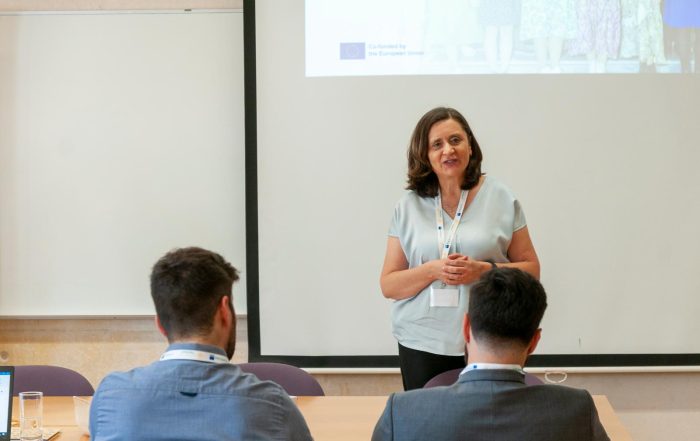Interview
The CATALYST project aims to create a Centre of Professional Excellence shared by five countries, offering 70 online courses to support European micro, small and medium-sized enterprises. The project addresses organisational, social and economic sustainability, linking universities and companies.
What is the aim of this project, which focuses on education and vocational training?
CATALYST aims to qualify entities in the business system, particularly SMEs, which are the most lacking in terms of qualifications for a green and digital economy, and also to contribute to improving public policies that are linked to the green transition. The aim is to make a link between the traditional qualification system, the education system and public policies, because this link is often lacking. Vocational Education and Training (VET) is fundamental to a systemic and long-term change in European economies, so that they are more sustainable and resilient. New skills are also needed to seize the opportunities arising from the sustainable digital transition.
Our focus is therefore on preparing SMEs and their human capital for the challenges and changes in business models linked to sustainability. SMEs are responsible for more than 60 per cent of employment in Europe and most innovation comes from them, contrary to popular belief. In Portugal and other countries, they make up approximately 98 per cent of companies. But SMEs are also the most fragile companies, because they lack financial resources, management capacity and the skills of their human capital.
Many partners are involved in CATALYST. How is it being realised in Portugal?
The project in Portugal involves three partners: Iscte, which is the national coordinator; ICAA – Associação para a Gestão do Capital Intelectual (Association for the Management of Intellectual Capital) and CENTIMFE – Centro da Indústria Tecnológica dos Moldes e Plásticos (Centre for the Technological Industry of Moulds and Plastics). The project is very much based on knowledge and intellectual capital management. The entire application was based on the idea that by better managing organisations’ intangible resources, they will be better prepared to meet the challenges of sustainability and the digital transition.
CENTIMFE, for its part, works in a very strategic cluster of our economy, where most of the production is for export. It requires cutting-edge technology that complies with many sustainability standards. The companies supported by CENTIMFE produce for the automotive sector, which is highly demanding in terms of sustainability criteria, not only in environmental terms, but also in social terms. They are very competitive companies.
In short, there are three organisations working together towards a common goal, in an excellent partnership.
How far do these three partners want to go?
CATALYST is a starting point, but the end point will be to create a structure: the CoVE – Centre of Vocational Excellence.
In Portugal, the three partners have already launched this structure, and we’ve called it the Future Skills Factory. Once the project is finished, the aim is to bring in other partners who can help us identify what skills companies will need in the future. We want to leave something that can function as a kind of ‘observatory’, which identifies what is needed for vocational training to have real effects. We’ve been through several Community Frameworks and, although a lot of money is spent, there are often no results.
We want to improve this by anticipating what companies should do, how they should do it, what the best practices are and, if possible, influencing public policies to leverage this process. The Future Skills Factory is using the CATALYST project to take its first steps, but aims to continue after the project, with autonomy.
Vocational education and training are fundamental to a systemic and long-term change in European economies, enabling them to achieve greater sustainability and resilience.

Florinda Matos is the coordinator of the project
In addition to organisations linked to Iscte, is there also interest from public bodies?
We have Iscte organisations – the subsidiaries IPPS and Audax and the School of Applied Technologies – Iscte-Sintra – and in February we also managed to bring in other partners, such as IAPMEI.
Although the project is very much focussed on sustainability, you can’t talk about that without digital transformation. There are other entities we’d like to involve in the project, such as the IEFP (Institute for Employment and Vocational Training), not least because many of the courses offered by vocational training centres don’t respond to the needs identified by the business world.
What other outputs can you expect from the project?
CATALYST will produce 70 vocational training courses in skills related to sustainability, digital transformation and intellectual capital. We believe that if we can balance these three elements in companies, they will be more productive, competitive and sustainable. In the case of Iscte, we are preparing eight courses, with subjects such as Knowledge Management and Innovation, Digital Transformation and Sustainability, etc. CENTIMFE will have courses in the area of the circular economy and, in the case of the ICAA, in the area of intellectual capital. The other countries involved – Germany, Austria, Greece, North Macedonia and a European sustainability network based in France, SDSN (Sustainable Development Solutions Network) – are also preparing these courses. In total, there are 16 partners from five countries, plus 40 associated partners from six other European countries.
The training will be available in the form of free, online courses, in the form of initial, intermediate and advanced courses. We’re in a very active phase of the project, as the courses have to be presented to companies by the end of 2024. We are working on them on the Moodle platform, which will be connected to the project website.
The courses will all be in English. We are also considering the possibility of each country being able to deliver the courses in its own language to meet the needs of companies, especially SMEs.
We already know that CENTIMFE companies will be the first to be invited to use this training offer in the evaluation phase, so that the necessary fine-tuning can then be done. When the project is finished, we’ll have synchronous or asynchronous courses, tailored to the recommendations we can make in the future. Another aim of the project is to influence the suitability of our curricula, so that when students leave university they have the skills that the market is looking for.
Was it necessary to make a prior selection of the themes that the courses would focus on?
Yes, that has already been done. The project began with each country surveying its needs. We allocated the development of the courses according to the needs of each country, which are very different. Even the regulations for each course differ from country to country. For example, North Macedonia, not belonging to the EU, is not obliged to comply with some European directives on vocational training. The Germans, on the other hand, are much more focused and developed on aspects of the circular economy, which has to do with their own industry.
The idea is that, at the end of this Community Framework, each country will have a Centre of Professional Excellence that will form part of a European network, which could be replicated in Europe through these CATALYST – Centre for Sustainable Transformation.
We in Portugal are thinking about this from a future perspective, beyond the end of the project.
What are the specific features of the training courses you are building?
The courses of up to 10 hours are basic, completely asynchronous, with videos and texts. The intermediate courses are more developed, but they are also asynchronous, with up to 20 hours. Advanced courses can be up to 30 hours and are mixed (they have both asynchronous and synchronous components). Some courses have associated resources and services such as mentoring or consultancy. One of the courses we have is Intellectual Capital and Change Management for Digital Transformation and Sustainability. There will be scheduled days for the trainer to be online synchronously, giving feedback to the trainees. These blended courses are more complex, so they are also a minority in the project. We have topics in the area of Sustainable Development, Resilient Transition, Sustainable Business Management, Intellectual Capital Management, Circular Economy, Business Transformation, etc.
This is a project of five countries in partnership (plus a French partner), led by North Macedonia. How did Iscte get involved?
The North Macedonian partners, the IECE – Institute for Research in Environment Civil Engineering and Energy, wanted to integrate intellectual capital management into the project; as this is my area of expertise, they contacted me and also promoted the involvement of the ICAA. I’ve noticed that countries outside the European Union are very active in bidding for European projects.
The project ends in May 2026. What is planned in terms of project dissemination initiatives?
We have a lot of online meetings, workshops, even team meetings, dissemination, and communication meetings. We often create dissemination events in which we involve other stakeholders. In the phase of structuring the courses, Iscte is leading all the training on how to structure an asynchronous or mixed course in Moodle: what modules it should have, how to make an interactive course, etc. We monitor this and check that it complies with the defined standards. The initial testing phase runs until September. It’s labour-intensive and very challenging. Every year we have at least one big face-to-face meeting with all the partners. The project kicked off in North Macedonia in 2022. In June 2023, we marked one year of the project here at Iscte. All the partners came to this workshop, which was very important. Then there were two more workshops in Austria that year, in Vienna and Graz. In April 2024, the workshop was in Greece and in November this year it will be in Germany. The year 2025 will essentially be spent on the ground, applying and testing the courses in companies. In 2026, the closing meeting of the project will take place in North Macedonia.




